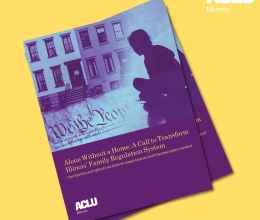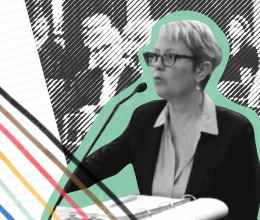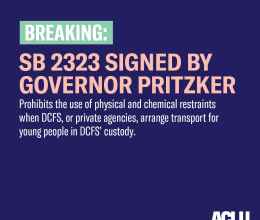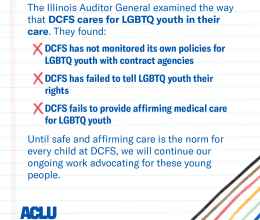
On February 18, Governor Rauner announced his intention to craft a state budget that protects our most “vulnerable” youth. To accomplish this goal, however, he seeks to eliminate all funding and services for a uniquely vulnerable population: foster youth ages 18 to 21. These are critical ages in development, and a period when adolescents need our support in preparing for a full and productive adulthood. The undersigned have long advocated for this vulnerable age group. Ending essential supports for this population is morally unconscionable and fiscally irresponsible. It also would violate Illinois' laws, federal and state court consent decrees, and accepted best practices.
There is increasing consensus that 18-21 year-olds require continuing support. Foster youth, in particular, have experienced traumas that can impact their adolescence. In addition, they face hurdles - notably the absence of a safety net - that makes transition to independence even more challenging.
Foster youth forced into premature “independence” fare worse by every measure and at great cost to their own development. Without adult guidance and support, they are less likely to attain educational and employment goals. The odds then rise that they will require public assistance, face homelessness, have a harder time accessing health care and mental health services when needed, and become involved in our criminal justice system.(1) The problems also come at great expense to the state, because the costs will significantly exceed any short-term savings. Along with these cuts, the Governor’s budget also cuts social services these youth might otherwise turn to, including support for higher education, childcare, homeless supports, community health programs, and community substance abuse treatment programs.
In line with the recognition that foster youth in this age group are an at-risk population, both the federal (2) and state (3) governments have moved to extend, rather than reduce, services, providing college scholarship, transitional and independent living options, mental health counseling, and supports for pregnant and parenting teens. Governor Rauner’s proposal to turn foster youth out onto the streets is contrary to our laws and the consensus of social science researchers, and is financially reckless.
We urge legislators and advocates to demand the continuation of services for foster youth up to age 21, and existing supports for qualifying youth pursuing college degrees, to truly prepare them for the independence and adulthood that all our citizens deserve. Illinois was a leader in extending services to youth up to age 21 who are not yet prepared to live on their own. Instead of cutting these services, we should work to leverage federal dollars, strengthen programs to prepare our youth for success, and protect these vulnerable young adults.
(1) Midwest Evaluation of the Adult Functioning of Former Foster Youth; http://www.chapinhall.org/research/report/midwest-evaluation-adult-functioning-former-foster-youth (2) The federal government significantly expanded its support for this population through the passage of both the Chafee Foster Care Independence program in 1999 and the Fostering Connections Act in 2008 (3) Illinois extended care in 1987. Since then, the majority of states have followed. Most recently, Alaska (2012), California (2012) and Florida (2014) enacted legislative changes extending state responsibility for abused and neglected minors to the age of 21.
Coalition to Support the Future of Our Youth
(in formation)
| • 360 Youth Services, Naperville• Access Living of Metropolitan Chicago• Adler University (including Institute on Public Safety & Social Justice)• AIDS Legal Council of Chicago • Alternatives, Inc. • American Civil Liberties Union of Illinois • Aunt Martha’s Youth Service Center • Be Strong Families • Blue Sky Bakery and Café • Center for the Human Rights of Children, Loyola University Chicago • Chicago Coalition for the Homeless • Chicago Medical-Legal Partnership for Children • Child Care Association of Illinois • Children and Family Justice Center, Northwestern School of Law • Children’s Home and Aid • Children’s Home Association of Illinois, Peoria • Civitas ChildLaw Center, Loyola University Chicago School of Law • Community Crisis Center, Elgin • Community Elements, Champagne • El Rescate/Vida Sida • FCAN (Families’ and Children’s AIDS Network) • The Family Defense Center • Foster Care Alumni Association of America • Foster Care Alumni Association of America, Illinois Chapter • The Harbour, Inc. • Health and Medicine Policy Research Group • Heartland Alliance |
• Heartland Human Care Services• Hoyleton Ministries, Hoyleton• Illinois Coalition Against Sexual Assault• Illinois Coalition for Community Services, Springfield • Introspect Youth Services • James B. Moran Center for Youth Advocacy • La Casa Norte • Lakeside Community Committee • MYSI, Corporation • New Moms, Inc. • The Night Ministry • North American Council on Adoptable Children • Office of the Cook County Public Guardian • Passages Alternative Living Programs, Inc. • Prison and Neighborhood Arts Project • Primed for Life • Project Oz, Bloomington • Sargent Shriver National Center on Poverty Law • Strengthening Families Illinois • Struggling Youth Equals Successful Adults • UCAN • Unity Parenting and Counseling • Universal Family Connections, Inc. • University of Illinois School of Social Work • Voices for Illinois Children • Windy City Times • Young Invincibles • Youth Outreach Services • Youth Service Bureau (Springfield) |
For more information, contact Anita Weinberg, Civitas ChildLaw Center, Loyola University Chicago School of Law aweinbe@luc.edu


